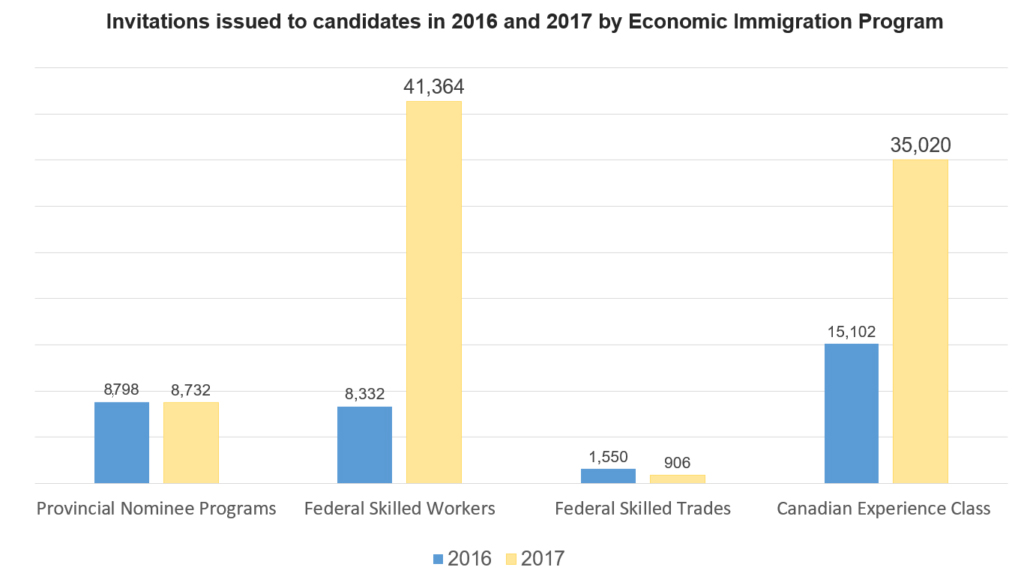Immigration
New Express Entry report shows Federal Skilled Worker invitations jumped by 400% in 2017

The anticipated year-end report says Invitations to Apply, or ITAs, issued to candidates in the Federal Skilled Worker Program rose from 8,332 in 2016 to 41,364 in 2017 while invitations issued to Canadian Experience Class candidates rose from 15,102 in 2016 to 35,020 in 2017. (Photo by CIC News)
Candidates in Express Entry’s Federal Skilled Worker Class and Canadian Experience Class benefited the most from changes to the way candidates in the federal economic immigration system’s pool are awarded points, says a new report published Thursday.
The anticipated year-end report says Invitations to Apply, or ITAs, issued to candidates in the Federal Skilled Worker Program rose from 8,332 in 2016 to 41,364 in 2017 while invitations issued to Canadian Experience Class candidates rose from 15,102 in 2016 to 35,020 in 2017.
Federal Skilled Workers were also the beneficiaries of faster processing times. In 2017, 80% of Federal Skilled Worker Applications were finalized in 4 months or less, down from 6 months or less in 2016.
Express Entry had its biggest year to date in 2017, issuing 86,023 Invitations to Apply, or ITAs. This total dwarfed the combined totals of 2016 and 2015, when 33,782 and 31,063 invitations were issued, respectively.
The unprecedented number of ITAs issued in 2017 also corresponded with the lowest Comprehensive Ranking System (CRS) cut-off score yet seen – 413 – on May 31, 2017.
“The Express Entry pool is now the main source of permanent residence applications for the economic immigration category of IRCC’s multi-year immigration levels plan,” Immigration, Refugees and Citizenship Canada says in the report.
“In 2017, 86,022 invitations were sent, 109,497 applications were received, 93,596 visas were issued and 65,401 permanent residents and their families were admitted into Canada.”
While the 2017 results were the highest ever reported, the immigration levels plans for 2018, 2019 and 2020 call for increases in the number of admissions through Express Entry.
CRS changes have big impact
IRCC’s year-end report reflects observations published in December 2017, namely that 90 per cent of Express Entry candidates who received an ITA for permanent residence in the first half of 2017 did not have a Canadian job offer. This was up from 62 per cent in the 11 months prior to November 19, 2016, when IRCC introduced targeted improvements to the way candidates are ranked.
Chief among these improvements was a reduction in the number of points awarded for a job offer from 600 to either 50 or 200, depending on the position. IRCC found that this improvement significantly shifted the number of ITAs for Canadian permanent residence in favour of candidates with higher human capital scores, namely candidates in Express Entry’s Federal Skilled Worker Class.
Human capital factors include age, proficiency in English and French, education, and work experience. Combined, they provide what is known as a candidate’s core Comprehensive Ranking System (CRS) score, which can reach a maximum of 600 points.
Additional factors are also considered and award bonus CRS points. They are:
- Provincial Nomination (600 points)
- Arranged Employment (maximum 200 points)
- Canadian Educational Credentials (maximum 30 points)
- French-language Proficiency (maximum 30 points)
- Sibling in Canada (15 points)
Fifty per cent of Express Entry candidates invited in 2017 did not claim additional points. Of the 50 per cent that did claim additional points, 22 per cent had a provincial nomination.
Most Canadian provinces and territories admitted a higher number of newcomers through Express Entry in 2017 than in 2016, with the total admissions increasing from 33,411 to 65,401.
Changes alter occupation mix of candidates
IRCC said the targeted changes have had a major impact on the occupations represented by candidates who received an invitation in 2017.
Information Systems Analysts and Consultants, Software Engineers and Computer Programmers and Interactive Media Developers remained unchanged as the top three occupations between 2016 and 2017, but the number invited in each category increased substantially. Meanwhile, occupations like cooks, food service supervisors and retail sales supervisors dropped noticeably in the occupational rankings between 2016 and 2017.
IRCC said reducing the points for a job offer has worked to favour candidates with higher core human capital scores.
“The Arranged Employment additional points are now balanced with the core CRS (that is, human capital), which means that candidates with a qualifying arranged employment need a sufficiently high core CRS to receive an invitation,” IRCC said.
The report also noted that 43 per cent of of the 8,195 invited candidates in 2017 with Arranged Employment points benefited from a Labour Market Impact Assessment exemption.
Country of residence – Smaller Percentage of Invited Candidates Residing in Canada
Looking at the top 10 countries of residence of invited candidates in 2016 and 2017, India and the United States remained the top two foreign countries of residence. China, which was third in 2016, was replaced by Nigeria and dropped to eighth place in 2017. Canada was ranked first overall both years, but the percentage of people living in Canada who received ITAs dropped from 64 per cent in 2016 to 49 per cent in 2017.
“The much anticipated 2017 year end report provides many additional details as to who Canada is inviting to apply for residence and how the Express Entry system is improving.”
“The report also adds to the anticipation around Express Entry this year: With increased immigration targets, the elimination of the pre-express entry backlog, and changes from mid 2017 having an entire year to play out, 2018 should also be a very interesting year. ”





















